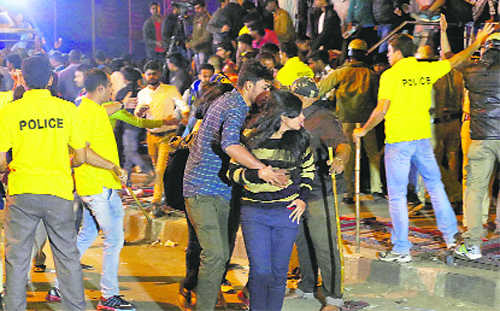
In public spaces, women are treated as a ‘thing’ that can be groped and touched.
Vandana Shukla
In the land of the valorous Rajput kings, amidst intimidating citadels and forts, you come across a place called Saheliyon-ki-badi, a delicately carved marble garden of the maidens, in Udaipur. Built in 1740, for the queen and her 48 maids, the exclusive space was created to offer privacy to womenfolk who could enjoy their pleasure activities, away from male gaze and scrutiny.
Public spaces--from village level panchayat chaugan to the king’s courts-- had no room for women. This was the time when women observed purdah and would opt to die on the pyre of their husband. All -female spaces like Saheliyon ki badi, in the middle of the town, were a rarity.
In 2012, Nizamuddin Basti in Delhi, where houses and buildings suffocate in their cheek by jowl existence, when a Zenana park was inaugurated, women of the locality felt ecstatic. In the twenty first century, all spaces are open to women albeit, they can’t claim these places as theirs. Worse, they don’t feel safe in public spaces. Stress on gender equality, by a strange twist, is pushing women back to their safety zone—the home—or the women’s-only spaces. Hence the need to build high walls was felt by the Agha Khan Trust for Culture, which started the community initiative, and also appointed a guard for the safety of women.
Public spaces are masculine spaces in India, for the assumed role of significance assigned to men. Despite a large number of women’s presence in the work force, and their noteworthy contribution, the spaces, meant to be common, fail to offer equal space and freedom to females. Women are continued to be treated as intruders, the ‘other’, a ‘thing’ that can be groped and touched. The threat does not exist only in metropolises, where anonymity offers a security mask. Small towns too feel the need to provide women their exclusive ‘safe’ spaces.
Few months back I visited Qadian, a small town in Punjab and was surprised to see a beautiful garden that opened only for women in the evening hours; it had all- female security guards. Women from all communities came there to bond with each other-- to feel free and secure.
The culture that boasts of still unbroken traditional family values based on mutual respect and high success rate of marriages, states, men and women can’t co- exist in public spaces. In Coimbatore, yet another all-women park is created, to offer ‘security’. Well meaning though all-female spaces do great disservice to the goal of achieving gender equality.
The dichotomy—that a woman, total stranger before marriage-- can earn respect as a partner for life but can’t be a co-passenger in a bus, train or a cab, for a few hours, is baffling. Almost all women undergo harrowing experience of traveling with male passengers. The more women aspire for gender equality, the more they are pushed back to the ‘safety zones’ of the 18th century. That such spaces lack inclusive culture of gender equality is worrying.
Most women-only spaces are a welcome refuge from lewd looks, groping and unwanted male attention. The concept appeals to women for the immediate relief it offers. But they further strengthen the psychological gender barriers. The trend of seeking safety in separate spaces threatens the gains that women have made in education by accessing new career fields over the past several decades. Such steps are certainly not modernizing society, nor do they make women feel more secure.
Segregation restricts freedom. Women’s free movement needs facilitation, not restriction. For years governments have been introducing all-women buses and locals or, separate coaches for women. These should have been used as methods to help transition from a time when few women were part of the work force. In the age and times when number of women head financial institutions, creating all-women banks is, to ridicule their accomplishments. Segregating genders is not the answer to check social misconduct of men. Such steps are pushing women back to the spaces, they ventured out with great difficulty. The patriarchal message sent by these steps is; you need protection from us, not equality.
If the successive governments took gender equality with the seriousness it required, they would have spent more time and resources on building working women’s hostels, on planning public spaces in a way that they pose no threat to women.
In a study conducted by IGNOU, it was found Haryana, with so many burgeoning towns that offer employment opportunities to women, who migrate from small towns to metros, only 20 working women’s hostels are available, Punjab has just 14. Women are pushed into the workforce, without first planning and creating infrastructure that would make them feel at home, if not welcomed. Fed on patriarchal entitlement that is further reinforced by segregation of women, their presence in public spaces is treated as usurpation of male right.
Post public outrage, intensified by media channels, following an incident of gangrape or mass molestation, as was the case after Nirbhaya case, governments go to any extent to calm down public sentiment. The only solution their think tanks can come up with-–to ensure security of women is--by further limiting their freedom by way of limiting them to all-women facilities. Little is done thereafter to address the attitude of male entitlement over women’s rightful spaces.
If women have to work with men, share office and recreational spaces with them, how far is segregation going to reduce gender violence? It needs re-think.


























